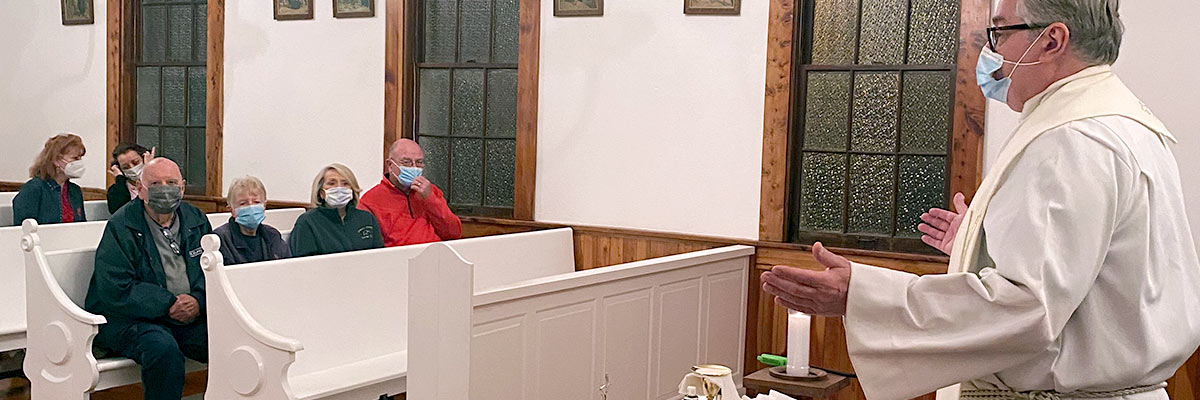Official Website of the
Catholic Diocese of Little Rock
25th Sunday in Ordinary Time, Year B, 2024
Published: September 22, 2024
Bishop Anthony B. Taylor preached the following homily during a Mass with the Equestrian Order of the Holy Sepulchre of Jerusalem at the Cathedral of St. Andrew in Little Rock on Saturday, Sept. 21, 2024, and a Mass for students at the Greek Theater on the campus of the University of Arkansas in Fayetteville on Sunday, Sept. 22, 2024.

Bishop Taylor
The Gospel of Mark struggles with the scandal of ambition in the life of the early Church. He displays the disciples’ failures not so that we can marvel at their ineptitude, but rather to bring us face to face with our own human tendencies to seek our own glory in competition with others, which hinder us from yielding ourselves to God’s marvelous plan.
The long-awaited Messiah was to have been a powerful, exalted figure, as we see in today’s first reading from the book of Wisdom where it says, “If the just one be the Son of God, God will defend him and deliver him from the hand of his foes.” But that’s not how they experienced Jesus.
Rather, our first reading continues, the wicked say “with revilement and torture let us put the just one to the test.” And so in today’s Gospel Jesus applies this to himself, teaching his disciples — for the second time — that “the Son of Man is to be handed over to men and they will kill him, and three days after his death the Son of Man will rise.”
And now the scandal of the cross can be seen for what it is — true greatness. Leading to resurrection. Hope for the hopeless, the cross breaking the power of sin and death. Love for the unlovable in union with God, whose very nature is love. Life for the lost.
And that’s where true greatness — about which the disciples had been discussing — can be found: “If anyone wishes to be first, he shall be the last of all and the servant of all.” Jesus is going to look foolish. He kept pouring himself out on what appeared to be a lost cause. After three years of effort, most of his followers fled at the first sign of trouble. He was arrested and executed like a criminal. People wagged their heads and jeered at him as he hung on the cross. An apparent failure. Everything but a powerful, exalted figure.
The early Church struggled with the temptation to ambition, and this is what the Apostle James is dealing with in our second reading, where he says “where jealousy and selfish ambition exist, there is disorder and every foul practice. But the wisdom from above is first of all pure, then peaceable, gentle, compliant and full of mercy.”
People in James’ community were embarrassed to remember that they had once talked about becoming important. You'd expect that the chosen ones, the Messianic Community, would be a powerful, glorious, exalted group. But in fact, they experienced the same rejection and lowliness as their master. They poured themselves out for others, and for this they were harassed, persecuted and martyred. They shared the same humble reality as their Savior.
And to their credit, they remembered that they could achieve true greatness only by imitating Jesus — only by making themselves the least of all and servants of all, pouring themselves out for others. That's what many of the early Christians did. And while the time of the early Church might seem to us to have been glorious from this distance of 20 centuries, I assure you that it seemed anything but glorious at the time.
The early Christians were hated by much of society and attracted mainly the fringe element: the ne'ere-do-wells, the poor, the slaves, the uneducated. People who had nothing to lose.
You and I are faced with the same challenge as the early Church, even though our specific issues are different. We now have the proper perspective, the proper distance to see that Jesus' true greatness can be found not so much in his glorious victories as in the way he poured himself out for us. And now the scandal of the cross can be seen for what it is — true greatness. Leading to resurrection. Hope for the hopeless, the cross breaking the power of sin and death. Love for the unlovable in union with God, whose very nature is love. Life for the lost.
Similarly, the true greatness of the early disciples can be found in the way that they poured themselves out for others. They show us that the way to true greatness consists in risking failure, risking looking foolish, pouring ourselves out for others — particularly those who seem most lost, most hopeless, least lovable. Living the good news in all humility and spreading the good news in selfless service. As Jesus says in today's Gospel: "If anyone wishes to be first, he shall be the last of all and the servant of all."









